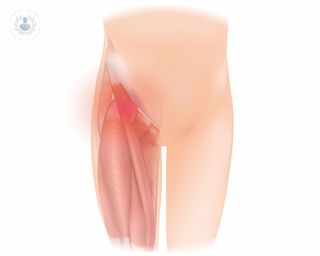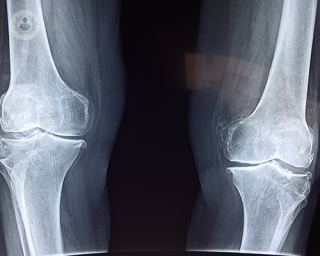What is hip pain?
Hip pain is the discomfort that occurs in the hip or around it, including in the groin, thigh or knee.
Pain in the hip can be accompanied by heat in the painful area, fever, swelling, or stiffness in the hip joint. You might find it difficult to walk or stand, bend over, or sit down without discomfort.

What are the causes of hip pain?
There are a wide range of things that can cause hip pain.
Acute injuries or conditions affecting the hip in the short term include:
- hip fractures
- hip labral tears
- muscle strain
- infection in the bones or joints of the area
Chronic conditions which can cause hip pain include:
Finally, some conditions can affect the hip indirectly. One of the most common in older age is spinal stenosis, which can affect the nerves in the lower part of your spine and cause sharp pain down the hips and legs.
Can hip pain be prevented?
You can help protect your hip joint by:
- Always warming up before exercise
- Ensuring you have the correct walking equipment if you are unsteady on your feet to avoid falls
- Avoiding exercises that elevate one hip over the other (running on uneven surfaces)
- Warming up before each exercise
- Using protective pads on the hip when playing contact sports
- Maintaining a healthy weight
- Strengthening your back and legs to support your hips with careful strength training
Some conditions, such as spinal stenosis, cannot be fully prevented, and you may require medical treatment.
What is the treatment for hip pain?
The treatment will depend on the pathology that causes it. In most cases, the first line of treatment is non-surgical and includes exercises, weight control, physical therapy, orthopaedic legwear, heat and cold therapy, and acupuncture. All of these aim to reduce the pain in your hip and improve your range of motion.
In some cases, a pharmacological treatment is also required, which can include:
- over-the-counter painkillers
- non-steroidal anti-inflammatory drugs
- steroid injections
In some cases, if the pain cannot be managed with conservative methods, surgery may be required, such as:
These procedures are carried out by an orthopaedic surgeon.
12-30-2015 11-02-2023Hip pain
Professor Ali Ghoz - Orthopaedic surgery
Created on: 12-30-2015
Updated on: 11-02-2023
Edited by: Carlota Pano
What is hip pain?
Hip pain is the discomfort that occurs in the hip or around it, including in the groin, thigh or knee.
Pain in the hip can be accompanied by heat in the painful area, fever, swelling, or stiffness in the hip joint. You might find it difficult to walk or stand, bend over, or sit down without discomfort.

What are the causes of hip pain?
There are a wide range of things that can cause hip pain.
Acute injuries or conditions affecting the hip in the short term include:
- hip fractures
- hip labral tears
- muscle strain
- infection in the bones or joints of the area
Chronic conditions which can cause hip pain include:
Finally, some conditions can affect the hip indirectly. One of the most common in older age is spinal stenosis, which can affect the nerves in the lower part of your spine and cause sharp pain down the hips and legs.
Can hip pain be prevented?
You can help protect your hip joint by:
- Always warming up before exercise
- Ensuring you have the correct walking equipment if you are unsteady on your feet to avoid falls
- Avoiding exercises that elevate one hip over the other (running on uneven surfaces)
- Warming up before each exercise
- Using protective pads on the hip when playing contact sports
- Maintaining a healthy weight
- Strengthening your back and legs to support your hips with careful strength training
Some conditions, such as spinal stenosis, cannot be fully prevented, and you may require medical treatment.
What is the treatment for hip pain?
The treatment will depend on the pathology that causes it. In most cases, the first line of treatment is non-surgical and includes exercises, weight control, physical therapy, orthopaedic legwear, heat and cold therapy, and acupuncture. All of these aim to reduce the pain in your hip and improve your range of motion.
In some cases, a pharmacological treatment is also required, which can include:
- over-the-counter painkillers
- non-steroidal anti-inflammatory drugs
- steroid injections
In some cases, if the pain cannot be managed with conservative methods, surgery may be required, such as:
These procedures are carried out by an orthopaedic surgeon.


Hip pain, groin pain and what causes them
By Mr Dean Michael
2025-01-20
Hip and groin pain is no laughing matter, and it is not a problem that is limited to elderly people. Sports injuries, accidents, and many other factors can lead to pain, so we asked consultant orthopaedic surgeon Mr Dean Michael to tell us more. See more


Painful knee clicking: causes and solutions explained
By Mr Graeme Nicholas Fernandez
2025-01-20
Why does your knee click? When should you see a doctor or specialist about painful clicking? Mr Graeme Nicholas Fernandez, one of the Uk's most experienced orthopaedic surgeons, answers these common questions and more to provide you with a solid understanding of painful knee clicking and the solutions available for each potential cause. He also clarifies how you can still receive help in the times of the COVID-19 pandemic. See more


Hip pain: What can happen if it is left untreated?
By Mr Numan Shah
2025-01-20
Hip pain is often a multifaceted issue, with varying symptoms and origins within the hip joint. While surgery isn't always necessary, finding the right treatment is crucial for pain relief. To tell us more, we invited renowned consultant orthopaedic surgeon Mr Numan Shah to share his expert insight on hip pain causes and the risks of ignoring it. See more


Hip arthritis: when is surgery required?
By Mr Ravichandran Karthikeyan
2025-01-20
In this article, Mr Ravi Karthikeyan explains in detail how hip arthritis occurs, what the symptoms are and when surgery is needed. See more
Experts in Hip pain
-
Mr William Bartlett
Orthopaedic surgeryExpert in:
- Sports injuries
- Hip replacement
- Knee replacement
- Hip pain
- Hip arthroscopy
- Knee arthroscopy
-
Mr Constant Busch
Orthopaedic surgeryExpert in:
- Hip replacement
- Knee replacement
- Hip pain
- Knee arthroscopy
- Joint injections
- Revision hip replacement
-
Mr Syed Ahmed
Orthopaedic surgeryExpert in:
- Hip replacement
- Revision hip replacement
- Hip pain
- Hip
- Hip resurfacing
- Joint injections
-
Mr Sam Heaton
Orthopaedic surgeryExpert in:
- Robotic surgery
- Osteoarthritis of the hip
- Hip pain
- Hip replacement
- Knee replacement
- Revision hip replacement
-
Mr Trevor Lawrence
Orthopaedic surgeryExpert in:
- Hip replacement
- Revision hip replacement
- Knee replacement
- Hip pain
- Arthritis
- Knee
- See all

London International Patient Services (LIPS)
London International Patient Services (LIPS)
5 Devonshire Place, W1G 6HL
No existe teléfono en el centro.
By using the telephone number provided by TOP DOCTORS, you automatically agree to let us use your phone number for statistical and commercial purposes. For further information, read our Privacy Policy
Top Doctors

Sheffield Orthopaedics Ltd
Sheffield Orthopaedics Ltd
Claremont Hospital, 401 Sandygate Rd, Sheffield
No existe teléfono en el centro.
By using the telephone number provided by TOP DOCTORS, you automatically agree to let us use your phone number for statistical and commercial purposes. For further information, read our Privacy Policy
Top Doctors

Cleveland Clinic London Hospital
Cleveland Clinic London Hospital
33 Grosvenor Place, SW1X 7HY
No existe teléfono en el centro.
By using the telephone number provided by TOP DOCTORS, you automatically agree to let us use your phone number for statistical and commercial purposes. For further information, read our Privacy Policy
Top Doctors
-
London International Patient Services (LIPS)
5 Devonshire Place, W1G 6HL, W1G Marylebone LondonExpert in:
- Orthopaedic spinal surgery
- Plastic surgery, reconstructive and aesthetics
- Hand and wrist
- Otolaryngology
- Foot and ankle
- Knee
-
Sheffield Orthopaedics Ltd
Claremont Hospital, 401 Sandygate Rd, Sheffield, SheffieldExpert in:
- Hip
- Orthopaedic surgery
- Orthopaedic spinal surgery
- Shoulder and elbow
- Joint replacement
-
Cleveland Clinic London Hospital
33 Grosvenor Place, SW1X 7HY, Central LondonExpert in:
- Cardiology
- Colorectal surgery
- Minimal access surgery (keyhole surgery)
- Gallbladder surgery
- Diagnostic Imaging
- Ultrasound
- See all
- Most viewed diseases, medical tests, and treatments
- Trigeminal neuralgia
- Chronic headache
- Ulnar nerve entrapment
- Peripheral nerve block
- Peripheral neuropathy
- Migraine
- Joint pain
- Lumbar herniated disc
- Abdominal pain
- Spinal surgery








